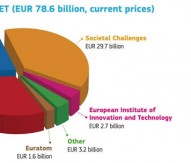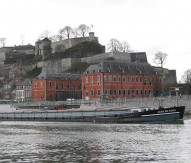

Bertrand Herry © NCP Wallonie
The National Contact Point of Wallonie
A requirement for all EU member states is the development and implementation of a National Contact Point (NCP). NCPs were originally created during FP5 and FP6 and act as key channels for advice and information regarding participation in the EU’s research and innovation framework programmes and related projects. The NCP system is also replicated in many of the framework programme’s associated countries.
NCPs have wide-ranging responsibilities and can be organised into many different structures and forms within member states. NCPs are frequently responsible for raising awareness of European Commission activities; arranging information events regarding future opportunities; assisting in administrative and legal procedures; organising training on research and technology development programmes; and providing feedback to the Commission.
NCPs exist across all of Belgium’s ten provinces. In 2002, the Government of the Walloon Region invited the Walloon Business Federation (Union Wallonne des Entreprises) (UWE) to develop an NCP for stakeholders in the area. Bertrand Herry, manager of NCP Wallonie, told Horizon2020projects.com about his responsibilities and expectations for the forthcoming framework programme.
What are the main responsibilities of Walloon Business Federation as a National Contact Point for FP7?
In Belgium, every federated entity has implemented its own NCP in order to provide stakeholders relevant to its jurisdiction with the best advice and support. Our mission is to increase Walloon’s participation in European-funded research and development programmes, with a dedicated focus on SMEs. As an NCP, we are invited to inform widely on the different European funding opportunities for R&D and to coach our clients during their proposal submission process.
We’ve been granted the opportunity to manage a large number of programmes and we feel that our portfolio, which includes the Seventh Framework Programme, Competitiveness and Innovation Framework Programme (CIP), Eurostars and several ERA-Nets, represents one of our major assets as it allows us to orientate our clients towards the more relevant programme with respect to their project ideas. Selecting the right programme is the key to success.
We offer a free-of-charge service to every person or company interested in participating in a FP7 or another European-funded R&D project within our portfolio. We can bring support to each stage of the project, from the idea to the final audit. The panel of our services follows every step of a project setting-up: information on opportunities; assessment of the project potential/client’s expertise and identification of the best suited programme; building of the consortium; financial and legal guidance; and support during the negotiation phase and during the reporting phase. Among our services, let’s point out our proposal reviewing service where we try to give a critical evaluation-like feedback to our client.
What is your relationship with the European institutions?
As an NCP, we are officially recognised by the Commission and we are continuously building and maintaining official relations with the European institutions along with personal interaction with project officers, heads of unit and directors. We consider this as an important requirement to ensure a high quality service to the Walloon stakeholders. Our geographic position close to Brussels allows business discussions to take place easily and we capitalise on this by scheduling frequent meetings.
Concretely, all our relationships are based on information. On the one hand, we have access to primary and premium information, and based on the different needs, we then transfer it to our clients. On the other hand, we are allowed to bring inputs from the Walloon stakeholders towards the European institutions; for example, one of our services during the preparation phase is the organisation of a meeting between the project officer and the proposal consortium in order to check the understanding of the work programme and the expected impact. We also participate in European workshops organised in Brussels, urging our clients to join too.
How do you expect your role as an organisation to develop during Horizon 2020?
Horizon 2020 is a new paradigm since it will be no more organised with a ‘purely’ thematic approach. Indeed, Horizon 2020’s philosophy is based on societal challenges, science and technologies aiming at a better life for citizens and it widens the scope from research and development to innovation. As an organisation, we will clearly adapt our structure in order to provide our clients with the best quality support.
Our mission will fundamentally remain the same, but we feel our services panel will be more transverse or will include some transverse components. To take into account the innovation aspects within Horizon 2020, we will steer our expertise towards the so called ‘close to market’ actions.
We think we are well prepared for Horizon 2020 as we have been combining the NCP missions for FP7 and CIP programmes for many years and we hope this will be an advantage for our Walloon stakeholders. Moreover, our historical focus on SME and our position within both the UWE and the Walloon innovation network maybe an important asset.
We are also closely following the developments regarding 2014-2020 European budget for research, rules and other guidance documents.
What actions are you taking to encourage greater awareness and participation in the next research framework programme?
We are currently deploying our communication strategy to spread the relevant, correct and update information about Horizon 2020. The strategy is based on the stakeholders’ need-to-know and is built on two levels: the individual level and the regional level.
On a day-to-day basis, we are in contact with individual stakeholders on our current services. We benefit from face-to-face meetings to communicate the relevant information according the stakeholders’ interests or needs.
To complete this, individual information on a regional level, and to encourage participation from Walloon stakeholders more widely, we’ve decided to organise, in the final quarter of 2013, a series of information days. In October, we will officially launch Horizon 2020 in Wallonia and we will be holding thematic events to communicate the relevant changes to stakeholder.
Providing correct information is a huge challenge for us, especially in the current Horizon 2020 negotiation phase at the European level. Our communication strategy has been designed to raise awareness relevant to targeted stakeholders.
What are your expectations for Horizon 2020 and the potential level of participation in Belgium?
We have important expectations for Horizon 2020 in Wallonia, as we feel that mixing the former DG research programme, namely FP7, and DG enterprise programme, namely CIP, is a major change and may have a great impact on Europe. Setting innovation at the heart of R&D programmes is very promising and will surely provide European stakeholders with many opportunities. Moreover, we do expect that the simplification of administrative and financial rules announced will increase the participation of SMEs.
At the Walloon level, we will make every effort to maintain the same rate of participation in Horizon 2020 as we did in FP7. As the NCP, our objective will remain unchanged and we hope that the new approach to the framework programme and the new SME instrument will meet industrial expectations. Results in FP7 for Walloon stakeholders were better than in FP6; we will surely commit to make results in Horizon 2020 even better.
We think that, at least in Wallonia, the existence of a NCP has had a very positive impact on FP7 participation. This success is undoubtedly due to our ten years’ experience and our deep expertise in European-funded R&D programmes, as well as our free-of-charge services. It must be stated that all this has been possible thanks to the commitment of the Walloon government and the Walloon public administration for research.
Bertrand Herry


